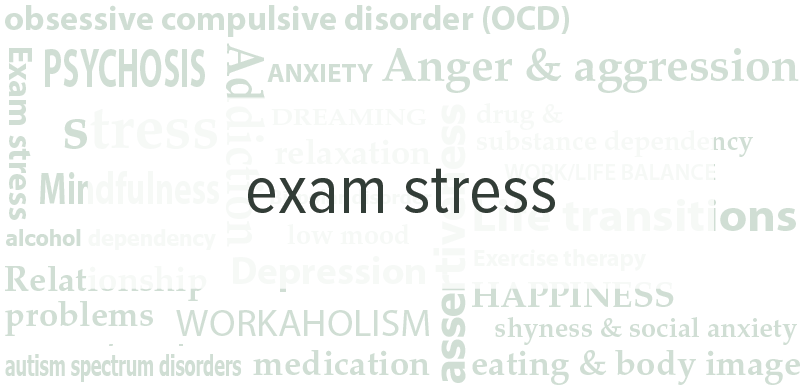Keeping on top of exam stress
Exam time may be a difficult time not only for the person doing the exams but also for those around them. The pressure to do well in exams can sometimes contribute to feeling worried and stressed, increasing the chances of overreacting to situations and possible conflict between those we love.
School exams can be particularly stressful because young people may feel that if they mess up they will ruin their lives. The subject of exams and the future may come up in every lesson and in every interaction with friends and family. It may feel like there is no escape from the pressure.
Help is at hand though, and there are strategies parents can use to try to avoid flashpoints for a smoother time during exams.
Practise relaxation exercises daily. This can help reduce stress and worry, and help avoid overreacting. Even if you're short of time, you can employ practices such as mindfulness while you go about your day, e.g. doing the washing up or taking out the rubbish.
Set time aside for fun and relaxation for yourself and your family. This can help foster positive feelings. Something as simple as going for a walk as a family is great way of improving mental health and wellbeing and boosting self-esteem, which can be particularly important at exam time.
Step away and take time out from any situation that is escalating into conflict and come back to it when you've had a chance to cool down and think things through.
Communicate when you're calm. If you have concerns, share them with your child when you are feeling calm. Adolescents commonly feel nagged by their parents, so try to keep things short and informal. If your child doesn't want to talk, try to find alternative ways of communicating with them, such as leaving encouraging notes for them.
Work with your child to find possible solutions to issues. When a child feels they have been involved in the solution, they are more likely to follow through with it.
Listen and try to understand how your child sees things and respect that they may need time and space. Everyone copes with stress differently and there may be differences between the way you and your child deal with things.
Think in advance about potential flashpoints and how you might deal with them differently. Seek the support of other family members if you feel it is appropriate and necessary. Try to identify things that might exacerbate exam-related anxiety, for example, if your child is drinking coffee or fizzy drinks to try and stay alert, these could be counterproductive.
Focus on the positives which can easily be forgotten during stressful times. Think about the positives and remind your child of them too. You could give your child a list of things that make you proud about them, which they can keep close to them when they are revising.
Don't give yourself a hard time if things don't go as planned. If you have had some difficult interactions with your child, try not to take it personally. Don't dwell on the negatives; think about why the problems have arisen and use the insight to your advantage if a similar situation develops again.
Support your partner and seek their support too. Speak to other parents who are in the same boat. Everyone experiences stress differently; if your partner is more relaxed about exam pressures than you are, perhaps you could agree for them to spend more time with your child until after the exams.
Feel free to contact us to ask about psychological therapies available at First Psychology Dundee that may help you manage stress and its causes.
Thom Irelan, Consultant Counselling Psychologist (Online only)










